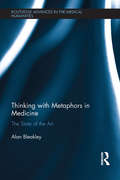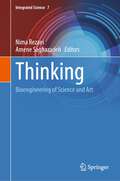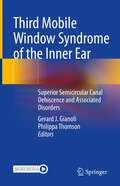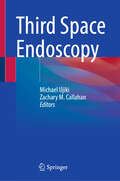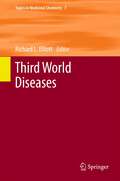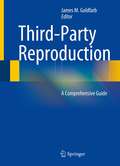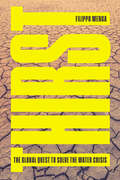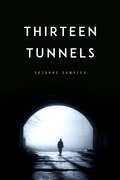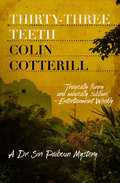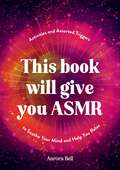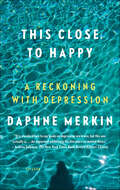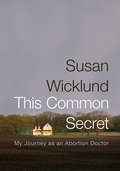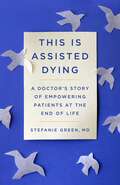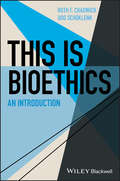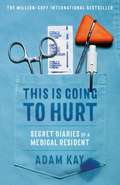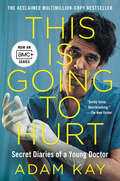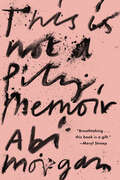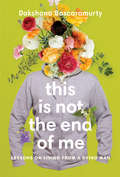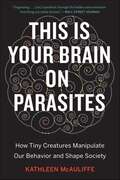- Table View
- List View
Thinking with Metaphors in Medicine: The State of the Art (Routledge Advances in the Medical Humanities)
by Alan BleakleyWhile medical language is soaked in metaphor, and thinking with metaphor is central to diagnostic work, medicine – that is, medical culture, clinical practice and medical education – outwardly rejects metaphor for objective, literal scientific language. This thought-provoking book argues that this is a misstep, and critically considers what embracing the use of metaphors and similes might mean for shaping medical culture, and especially the doctor–patient relationship, in a healthy way. Thinking With Metaphors in Medicine explores: how metaphors inhabit medicine – sometimes for the better and sometimes for the worse – and how these metaphors can be revealed, appreciated and understood; how diagnostic work utilizes thinking with metaphors; how patient–doctor communication can be better understood and enhanced as a metaphorical exchange; how the landscape of medicine is historically shaped by leading or didactic metaphors, such as ‘the body as machine’ and ‘medicine as war’, which may conflict with other values or perspectives on healthcare, for instance, person-centred care. Outlining the kinds of metaphors and resemblances that inhabit medicine and how they shape practices and identities of doctors, colleagues and patients, this book demonstrates how the landscape of medicine may be reshaped through metaphor shift. It is an important work for all those interested in the use of language and rhetoric in medicine, whether hailing from a humanities, social science or healthcare background.
Thinking: Bioengineering of Science and Art (Integrated Science #7)
by Nima Rezaei Amene SaghazadehThe “THINKING: Bioengineering of Science and Art” is to discuss about philosophical aspects of thinking at the context of Science and Art. External representations provide evidence that the fundamental process of thinking exists in both animal subjects and humans. However, the diversity and complexity of thinking in humans is astonishing because humans have been permitted to integrate scientific accounts into their accounts and create excellent illustrations for the effects of this integration. The book necessarily begins with the origins of human thinking and human thinking into self and others, body, and life. Multiple factors tend to modify the pattern of thinking. They all will come into play by this book that brings thinking into different disciplines: humanities, natural sciences, social sciences, formal sciences, and applied sciences. The thinking demands full processing of information, and therefore, the book considers the economy of thinking as well. The book thoroughly intends to explore thinking beyond the boundaries. Specifically, several chapters are devoted to discipline this exploration either by artistic thinking alone or by art and mathematics-aided engineering of complexities. In this manner, the book models variations on thinking at the individual and systems levels and accumulates a list of solutions, each good for specific scenarios and maximal outcomes.
Third Girl from the Left
by Christine Barker&“A beautifully written memoir of life on the Broadway stage at the onset of the 1980s AIDS epidemic . . . Compelling, and remarkably hopeful.&” —Mara Liasson, National Political Correspondent, NPR A moving, real-life account of making it as a dancer in New York City, embracing the changing faces of love and family, and being at ground-zero for one of the most fatal epidemics of modern times . . . Wanting to be a dancer while growing up in a large military family made Christine Barker somewhat of a black sheep, but she followed her dreams to New York City, where—in a moment of almost unbelievable good fortune—she was chosen for the London cast of A Chorus Line. London, and then New York, in the seventies and eighties opened up Christine&’s world. The creativity, culture, and nightlife were intoxicating, enough so to compel her older brother Laughlin to join her. Once there, the divorced father, veteran, and corporate lawyer met rising fashion star Perry Ellis. Romance and success soon followed—as well as rumors of a devastating new disease . . . Broadway&’s theater community is ravaged by loss as the AIDS epidemic takes hold, and Christine is shocked by the toll it&’s taken on her inner circle. Holding on tight to friends and loved ones left behind, the crisis becomes a crucible moment for her family and for all of society. And Christine is once again forced to go her own way to make sense of the tragedy.
Third Mobile Window Syndrome of the Inner Ear: Superior Semicircular Canal Dehiscence and Associated Disorders
by Gerard J. Gianoli Philippa ThomsonThis book aims to provide a deeper understanding of Third Mobile Window Syndrome and its various forms beyond just Superior Canal Dehiscence. It will illuminate the various presentations of Third Mobile Window Syndrome, provide the means for diagnosis, and elucidate treatments. The disorder Superior Semicircular Canal Dehiscence Syndrome was discovered in 1995 by Dr Lloyd Minor at The John Hopkins University School of Medicine in Baltimore. Though he published his findings in 1998, there remains no book wholly devoted to the topic. For this reason, many neurotologists and otorhinolaryngologists still misunderstand this condition and its presentation. Structured in six parts, the first part will be important in providing a context, and drawing together all of the learning that has been acquired since 1998, as well as explaining the complexities of the condition. The second and third parts will set out to detail all the aspects that are necessary for diagnosing a patient and then deciding on the best form of treatment, surgical or otherwise. Part four covers special situations, including bilateral SCDS and the pediatric patient. In part five, Philippa Thomson, a patient herself, will describe the patient perspective of symptoms and the complicated journey of identifying a diagnosis and securing expert care. Finally, part six covers future research. Third Mobile Window Syndrome of the Inner Ear: Superior Semicircular Canal Dehiscence and Associated Disorders will provide clinicians involved in the treatment of inner ear disorders, balance dysfunction, and dizziness with the expertise they need to assist patients with Third Mobile Window Syndrome. It will also supply useful information to neurotologists/otologists, otolaryngologists, and neurologists. Researchers in the field of inner ear disorders will also find this to be a valuable text.
Third Space Endoscopy
by Michael Ujiki Zachary M. CallahanThis book explores the applications of third space endoscopy - an innovative application of traditional endoscopy that facilitates surgical tissue removal, intentional scar formation, or muscle division in a minimally invasive and incisionless fashion. The main topics presented include tissue removal, such as endoscopic mucosal resection (EMR), endoscopic submucosal dissection (ESD), endoscopic full-thickness resection (EFTR) and peroral tumorectomy (POET); intentional scar formation, such as anti-reflux mucosectomy (ARMs) and transoral incisionless fundoplication (TIF); and muscle division, such as peroral endoscopic myotomy (POEM) of the cricopharyngeus (ZPOEM) and pylorus (G-POEM). Despite their existence for years, many of these applications are underutilized and perhaps under-recognized by the greater medical community. Additionally, third space endoscopy spans the entire body and is performed across numerous specialties, therefore creating a single resource that encompasses all the applications in-depth will be a powerful and convenient tool for practitioners. Third Space Endoscopy is an excellent resource for medical students, residents, fellows, and attending physicians in both the surgical and gastroenterological disciplines.
Third World Diseases
by Richard L. ElliottFederico Gomez de las Heras: Overview of Neglected Tropical Diseases Gwendolyn A. Marriner Amit Nayyar, Eugene Uh, Sharon Y. Wong, Tathagata Mukherjee, Laura E. Via , Matthew Carroll, Rachel L. Edwards, Todd D. Gruber, Inhee Choi, Jinwoo Lee, Kriti Arora, Kathleen D. England, Helena I.M. Boshoff, Clifton E. Barry III: The Medicinal Chemistry of Tuberculosis Chemotherapy Jeremy N. Burrows, David Waterson: Discovering New Medicines to Control and Eradicate Malaria Tomas von Geldern, Michael Oscar Harhay, Ivan Scandale, Robert Don: Kinetoplastid Parasites Pei-Yong Shi,, Zheng Yin, Shahul Nilar, Thomas H. Keller: Dengue Drug Discovery Dan Marquess: Recent Advances in Discovery and Development of Medicines for the Treatment of Secretory Diarrhea in the Developing World
Third World Health: Hostage to First World Wealth
by Theodore MacDonaldGreat and increasing inequities exist between the peoples of the Third World and those of the First. As well, we find ourselves threatened by imminent environmental catastrophes largely as a result of trying to maintain such inequities. This clear and straightforward text explains the complex origins of such bodies as the International Monetary Fund, the World Bank and others, and demonstrates the extent to which they exacerbate the problem. The situation is now so grave that we can no longer afford the luxury of leaving it to the professionals. We are all involved. We find ourselves hearing daily news reports of wars, starvation, the HIV/AIDS pandemic and natural disasters, rendered worse by inadequate international responses. The United Nations, once seen as an effective arbiter and mediator in such matters, now finds itself unable to exercise authority adequately. Third World Health: hostage to First World Wealth adopts a positive approach and puts forward various ways in which people at all levels can become more involved. It addresses the pivotal issue of health in the Third World and argues that it is very much hostage to the globalization of trade by and for the benefit of First World agencies.
Third-Party Reproduction
by James M. GoldfarbThe first IVF conceived birth in 1978 resulted in a significant growth of third party reproductive options which continue to raise ethical, legal, and psychological questions. Third party reproduction procedures can involve as many as five people: sperm donor, egg donor, gestational carrier, and intended parents. Third-Party Reproduction: A Comprehensive Guide utilizes experts in the field to address the medical, psychological, ethical and legal aspects of sperm donation, egg donation, embryo donation, and the use of gestational carriers. In addition, there are chapters on the medical and ethical aspects of posthumous reproduction, religious aspects of third party reproduction, and how to avoid pitfalls of third party reproduction. Aimed at physicians, trainees, psychologists, nurses, and social workers whose practices may include patients considering third party reproduction, the intent of this book is to provide a comprehensive and practical overview of the many aspects of third party reproduction to help all those involved to better understand them. Patients considering third party reproduction may also find value in this book.
Thirst: The Global Quest to Solve the Water Crisis
by Filippo MengaA groundbreaking account of the worsening global water crisis corporations and non-profits have failed to addressTwo billion people worldwide are without access to safe water. But solutions are hard to come by when causes are not clearly defined. In a whirlwind tour of global water insecurity, one of the world&’s leading experts on water politics chronicles the massive impact of climate change; insatiable water demands from industry and agriculture; and widespread lack of state investment in infrastructure. Menga focuses in particular on high priests of global developmentalism – celebrities, CEOs, and sustainability directors – who have emerged as some of the loudest voices about water issues while offering few tangible solutions. Thirst shows that if humanity is to escape the deadlock that bedevils access to clean water, it has to reconsider both its faith in the market and its relationship with nature.
Thirteen Tunnels
by Suzanne SamplesOn September 17, 2022, the literary world, indeed the whole world, lost a unique voice with the passing of Suzanne “ Hammer” Samples. Her final journey began in 2014 with a brain tumor diagnosis. She chronicled her struggles and triumphs even as she worked through post-surgery rehab including regaining the loss of arm and hand function. Suzanne' s rare courage and candor gave us a brutally honest and unflinching view of her life. Though she “ nagged” her editor and publisher to get her first book into print before she died, Suzanne outlived her prognosis. The memoir, “ Frontal Matter: Glue Gone Wild” went on to be named among the best books of 2019 by Kirkus Reviews and sent Suzanne on a phenomenal book tour where she wowed listeners with her experiences, stellar personality and dark wit. She continued on to write two sequels, “ Stargazing in Solitude” published to acclaim in 2021, and the “ 13 Tunnels” , even as she returned to teaching and started a literary magazine. Her trilogy offers insight, comfort, and understanding to the patients, caregivers, and loved ones dealing with this and similar devastating diagnoses. Suzanne lived life to the fullest and gave us great gifts along the way. She will be missed. -- Barbara Lockwood and Lisa Kastner
Thirty-Three Teeth
by Colin CotterillDr. Siri Paiboun, one of the last doctors left in Laos after the Communist takeover, has been drafted to be national coroner. He is untrained for the job, but this independent seventy-two-year-old has an outstanding qualification for the role: curiosity. And he does not mind incurring the wrath of the party's hierarchy as he unravels mysterious murders, because the spirits of the dead are on his side--and a little too close for comfort more often than he would like. With the help of his newly appointed secretary, the ambitious and shrewd Dtui, and Mr. Geung, the Down Syndrome-afflicted morgue assistant, Dr. Paiboun performs autopsies and begins to solve the mysteries relating to a series of deaths by what seem to be bear bites, to explain why the government official ran at full speed through a seventh-story window and fell to his death, and to discover the origins of the two charred bodies from the crashed helicopter in the temple at Luang Prabang. As it turns out, not surprisingly, not all is peaceful and calm in the new Communist paradise of Laos.
Thirty-Three Teeth
by Colin CotterillDr. Siri Paiboun, one of the last doctors left in Laos after the Communist takeover, has been drafted to be national coroner. He is untrained for the job, but this independent seventy-two-year-old has an outstanding qualification for the role: curiosity. And he does not mind incurring the wrath of the party's hierarchy as he unravels mysterious murders, because the spirits of the dead are on his side--and a little too close for comfort more often than he would like. With the help of his newly appointed secretary, the ambitious and shrewd Dtui, and Mr. Geung, the Down Syndrome-afflicted morgue assistant, Dr. Paiboun performs autopsies and begins to solve the mysteries relating to a series of deaths by what seem to be bear bites, to explain why the government official ran at full speed through a seventh-story window and fell to his death, and to discover the origins of the two charred bodies from the crashed helicopter in the temple at Luang Prabang. As it turns out, not surprisingly, not all is peaceful and calm in the new Communist paradise of Laos.
Thirty-Three Teeth
by Colin CotterillDr. Siri Paiboun, one of the last doctors left in Laos after the Communist takeover, has been drafted to be national coroner. He is untrained for the job, but this independent 72-year-old has an outstanding qualification for it: curiosity. And he doesn't mind incurring the wrath of the Party hierarchy as he unravels mysterious murders, because the spirits of the dead are on his side--and a little too close by his side more often than he'd like.With the help of his newly-appointed secretary, the ambitious and shrewd Dtui, and Mr. Geung, the Down-Syndrome-afflicted morgue assistant, Dr. Paiboun performs autopsies and begins to solve the mysteries relating to a series of deaths by what seem to be bear bites, to explain why the government official ran at full speed through a seventh story window and fell to his death and to discover the origins of the two charred bodies from the crashed helicopter in the temple at Luang Prabang. As it turns out, not surprisingly, not all is peaceful and calm in the new Communist paradise of Laos.
This Book Will Give You ASMR: Activities and Assorted Triggers to Soothe Your Mind and Help You Relax
by Aurora BellTap into the tingly world of ASMR (Autonomous Sensory Meridian Response) and experience the soothing power of sound with this immersive activity book. Teeming with tips and exercises, this mesmerizing book will trigger your ASMR reactions. Whether you're tracing patterns or creating your own tingle-inducing tools, this book will give you ASMR.
This Book Will Give You ASMR: Activities and Assorted Triggers to Soothe Your Mind and Help You Relax
by Aurora BellTap into the tingly world of ASMR (Autonomous Sensory Meridian Response) and experience the soothing power of sound with this immersive activity book. Teeming with tips and exercises, this mesmerizing book will trigger your ASMR reactions. Whether you're tracing patterns or creating your own tingle-inducing tools, this book will give you ASMR.
This Close to Happy: A Reckoning with Depression
by Daphne Merkin&“A cleareyed, insightful account of how she felt during her nosedives into despair . . . shot through with a self-awareness that helps readers cheer her on.&”—The New York Times A New York Times Book Review Favorite Read of the Year &“Despair is always described as dull,&” writes Daphne Merkin, &“when the truth is that despair has a light all its own, a lunar glow, the color of mottled silver.&” This Close to Happy—Merkin&’s rare, vividly personal account of what it feels like to suffer from clinical depression—captures this strange light. Merkin has been hospitalized three times: first, in grade school, for childhood depression; years later, after her daughter was born, for severe postpartum depression; and later still, after her mother died, for obsessive suicidal thinking. Recounting this series of hospitalizations, as well as her visits to myriad therapists and psychopharmacologists, Merkin portrays the lifelong arc of her affliction, beginning in a childhood largely bereft of love and stretching into the present, where she lives a high-functioning life and her depression is manageable, if not &“cured.&” The opposite of depression, she writes with characteristic insight, is not a state of unimaginable happiness, but a state of relative all-right-ness. In this dark yet vital memoir, Merkin describes not only the harrowing sorrow that she has known all her life, but also her early, redemptive love of reading and gradual emergence as a writer. Written with an acute understanding of the ways in which her condition has evolved as well as affected those around her, This Close to Happy is an utterly candid coming-to-terms with an illness that is still often stigmatized and shrouded in misunderstanding. &“[A] mesmerizing memoir.&” —Booklist (starred review) &“Brings a stunningly perceptive voice to the forefront of the conversation about depression, one that is both reassuring and revelatory.&” —Carol Gilligan, author of In a Different Voice
This Common Secret: My Journey as an Abortion Doctor
by Susan Wicklund Alan KesselheimIn This Common Secret Dr. Susan Wicklund chronicles her emotional and dramatic twenty-year career on the front lines of the abortion war. Growing up in working class, rural Wisconsin, Wicklund had her own painful abortion at a young age. It was not until she became a doctor that she realized how many women shared her ordeal of an unwanted pregnancy#151;and how hidden this common experience remains. This is the story of Susan's love for a profession that means listening to women and helping them through one of the most pivotal and controversial events in their lives. Hers is also a calling that means sleeping on planes and commuting between clinics in different states#151;and that requires her to wear a bulletproof vest and to carry a . 38 caliber revolver. This is also the story of the women whom Susan serves, women whose options are increasingly limited. Through these intimate, complicated, and inspiring accounts, Wicklund reveals the truth about the women's clinics that anti-abortion activists portray as little more than slaughterhouses for the unborn. As we enter the most fevered political fight over abortion America has ever seen, this raw and powerful memoir shows us what is at stake.
This House of Noble Deeds: The Mount Sinai Hospital, 1852-2002
by Arthur H. Aufses Jr. Barbara NissCelebrates the medical achievements and pays homage to the history of New York's mount Sinai Hospital systemOn January 15, 1852, nine men representing various Hebrew charitable organizations came together to establish the Jews' Hospital in New York with a vision of offering free medical care to the indigent Hebrews in the City who were unable to provide for themselves during their illness. This was the beginning of The Mount Sinai Hospital. Now, a century and a half later, This House of Noble Deeds celebrates the scientific and medical achievements of The Mount Sinai Hospital. From its original 45-bed building, the Mount Sinai Medical Center has developed into a state-of-the-art facility comprising a 1200-bed hospital, a major medical school, and a research enterprise with a faculty of almost 3000. Arthur H. Aufses, Jr. and Barbara J. Niss have identified and documented the most important scientific contributions of Mount Sinai over the past 150 years. They present histories of each major department and division, rich with anecdotes, biographical sketches, and photographs. In addition, they share the fascinating story of the hospital's creation and development, a story that ultimately transcends the parameters of the hospital itself and speaks to the broader matter of Jewish and medical history in New York.
This Is Assisted Dying: A Doctor's Story of Empowering Patients at the End of Life
by Stefanie GreenA transformative and compassionate memoir by a leading pioneer in medically assisted dying who began her career in the maternity ward and now helps patients who are suffering explore and then fulfill their end of life choices.Dr. Stefanie Green has been forging new paths in the field of medical assistance in dying since 2016. In her landmark memoir, Dr. Green reveals the reasons a patient might seek an assisted death, how the process works, what the event itself can look like, the reactions of those involved, and what it feels like to oversee proceedings and administer medications that hasten death. She describes the extraordinary people she meets and the unusual circumstances she encounters as she navigates the intricacy, intensity, and utter humanity of these powerful interactions. Deeply authentic and powerfully emotional, This Is Assisted Dying contextualizes the myriad personal, professional, and practical issues surrounding assisted dying by bringing readers into the room with Dr. Green, sharing the voices of her patients, her colleagues, and her own narrative. As our population confronts issues of wellness, integrity, agency and community, and how to live a connected, meaningful life, this progressive and compassionate book by a physician at the forefront of medically assisted dying offers comfort and potential relief. This Is Assisted Dying will change the way people think about their choices at the end of life, and show that assisted dying is less about death than about how we wish to live.
This Is Bioethics: An Introduction (This Is Philosophy Ser.)
by Udo Schuklenk Ruth F. ChadwickShould editing the human genome be allowed? What are the ethical implications of social restrictions during a pandemic? Is it ethical to use animals in clinical research? Is prioritizing COVID-19 treatment increasing deaths from other causes? Bioethics is a dynamic field of inquiry that draws on interdisciplinary expertise and methodology to address normative issues in healthcare, medicine, biomedical research, biotechnology, public health, and the environment. This Is Bioethics is an ideal introductory textbook for students new to the field, exploring the fundamental questions, concepts, and issues within this rapidly evolving area of study. Assuming no prior knowledge of the subject, this accessible volume helps students consider both traditional and cutting-edge questions, develop informed and defensible answers, and evaluate the strengths and weaknesses of a diverse range of ethical positions in medicine. The authors avoid complex technical terms and jargon in favor of an easy-to-follow, informal writing style with engaging chapters designed to stimulate student interest and encourage class discussion. The book also features a deep dive into the realm of global public health ethics, including the response to the COVID-19 pandemic. It considers topics like triage decision-making, the proportionality of society's response to COVID-19, whether doctors have a professional obligation to treat COVID-19 patients, and whether vaccines for this virus should be mandatory. A timely addition to the acclaimed This Is Philosophy series, This Is Bioethics is the ideal primary textbook for undergraduate bioethics and practical ethics courses, and is a must-have reference for students in philosophy, biology, biochemistry, and medicine.
This Is Going to Hurt: Secret Diaries of a Medical Resident
by Adam KayIn the US edition of this international bestseller, Adam Kay channels Henry Marsh and David Sedaris to tell us the "darkly funny" (The New Yorker) -- and sometimes horrifying -- truth about life and work in a hospital.Welcome to 97-hour weeks. Welcome to life and death decisions. Welcome to a constant tsunami of bodily fluids. Welcome to earning less than the hospital parking meter. Wave goodbye to your friends and relationships. Welcome to the life of a first-year doctor. Scribbled in secret after endless days, sleepless nights and missed weekends, comedian and former medical resident Adam Kay's This Is Going to Hurt provides a no-holds-barred account of his time on the front lines of medicine. Hilarious, horrifying and heartbreaking by turns, this is everything you wanted to know -- and more than a few things you didn't -- about life on and off the hospital ward. And yes, it may leave a scar.
This Is Going to Hurt: Secret Diaries of a Young Doctor
by Adam KaySoon to be a major AMC TV series starring Ben Whishaw and a 2.5 million-copy international bestseller, This Is Going to Hurt is Adam Kay’s equally “heartbreaking” and “darkly funny” (New Yorker) memoir of his years as a young doctor.Welcome to 97-hour weeks. Welcome to life and death decisions. Welcome to a constant tsunami of bodily fluids. Welcome to earning less than the hospital parking meter. Wave goodbye to your friends and relationships. Welcome to the life of a first-year doctor.Scribbled in secret after endless days, sleepless nights, and missed weekends, comedian and former medical resident Adam Kay’s This Is Going to Hurt provides a no-holds-barred account of his time on the front lines of medicine.Hilarious, horrifying, and heartbreaking by turns, this is everything you wanted to know—and more than a few things you didn’t—about life on and off the hospital ward.And yes, it may leave a scar.
This Is Not a Pity Memoir
by Abi MorganWhat happens when your partner of twenty years suddenly believes you’re nothing but a stranger? What do you do when your history together is gone?How do you prove you’re not an imposter in your own life? When the partner of Emmy Award–winning screenwriter Abi Morgan abruptly collapsed from a mysterious illness, doctors were concerned that he would not survive. Then, six months later, Jacob woke from his coma, to the delight and relief of his family and friends—except this proved to be anything but a Hollywood ending. Because to Jacob, the woman standing at his bedside, who had cared for him all these months, was not his partner. Not his children’s mother. Not the woman he loved. Sure, she looked like his Abi, but this was an imposter, living someone else’s life.Finding herself dropped into a real-life night-mare seemingly ripped from the pages of a thriller, Abi must find a way to hang on to not only their past but also their future together, before it slips away from them both. With grace, an irresistible sense of humor and refreshingly raw honesty, This Is Not a Pity Memoir grapples with a journey through fear and redemption few should have to face.What do you do when you are losing your love? You don’t write a pity memoir. You write a love story.
This Is Not the End of Me: Lessons on Living from a Dying Man
by Dakshana BascaramurtyFor readers of Paul Kalanithi's When Breath Becomes Air and Will Schwalbe, the moving, inspiring story of a young husband and father who, when diagnosed with terminal cancer at the age of thirty-three, sets out to build a legacy for his infant son. i can't make you feel what it's like to be a young, dumb, naïve thirty-year-old sitting in the back of a walk-in clinic waiting to be handed what is essentially a death sentence any more than i can show you what it feels like to have a husband or father or child who's dying and knowing there is nothing you can do to stop it. i can only describe to you how i feel today. angry. at peace. scared. grateful. a giant, spiky, flowering heart-shaped bouquet of contradictions. Layton Reid was a globe-trotting, risk-taking, sunshine-addicted bachelor--then came a melanoma diagnosis. Cancer startled him out of his arrested development--he returned home to Halifax to work as a wedding photographer--and remission launched him into a new, passionate life as a husband and father-to-be. When the melanoma returned, now at Stage IV, Layton and his family put all their stock into a punishing alternative therapy, hoping for a cure. This Is Not the End of Me recounts Layton's three-year journey as he tried desperately to stay alive for his young son, Finn, and then found purpose in preparing Finn for a world without him. With incredible intimacy, grit, and empathy, reporter Dakshana Bascaramurty casts an unsentimental eye on who her good friend was: his effervescence, his twisted wit, his anger, his vulnerability. Interweaving Layton's own reflections--his diaries written for Finn, his letters to his wife, Candace, and his public journal--she paints a keenly observed portrait of Layton's remarkable evolution. In detailing the ugly, surprising, and occasionally funny ways in which Layton and his family faced his mortality, the book offers an unflinching look at how a person dies, and how we might build a legacy in our information-saturated age. Powerful and unvarnished, This is Not the End of Me is about someone who didn't get a very happy ending, but learned to squeeze as much life as possible from his final days.
This Is Your Brain On Parasites: How Tiny Creatures Manipulate Our Behavior and Shape Society
by Kathleen McAuliffe“Engrossing . . . [An] expedition through the hidden and sometimes horrifying microbial domain.” —The Wall Street Journal Parasites can live only inside another animal and, as Kathleen McAuliffe reveals, these tiny organisms have many evolutionary motives for manipulating the behavior of their hosts. With astonishing precision, parasites can coax rats to approach cats, spiders to transform the patterns of their webs, and fish to draw the attention of birds that then swoop down to feast on them. We humans are hardly immune to their influence. Organisms we pick up from our own pets are strongly suspected of changing our personality traits and contributing to recklessness and impulsivity—even suicide. Germs that cause colds and the flu may alter our behavior even before symptoms become apparent. Parasites influence our species on the cultural level, too. Drawing on a huge body of research, McAuliffe argues that our dread of contamination is an evolved defense against parasites. The horror and revulsion we are programmed to feel when we come in contact with people who appear diseased or dirty helped pave the way for civilization, but may also be the basis for major divisions in societies that persist to this day. This Is Your Brain on Parasites is both a journey into cutting-edge science and a revelatory examination of what it means to be human. “If you’ve ever doubted the power of microbes to shape society and offer us a grander view of life, read on and find yourself duly impressed.” —Bookforum “Fascinating—and full of the kind of factoids you can’t wait to share.” —Scientific American“Humorous, inspiring, and macabre, this is infectious reading in the tradition of giants like Robert S. Desowitz and Jared Diamond.” —Michael A. Huffman, Primate Research Institute, Kyoto University
